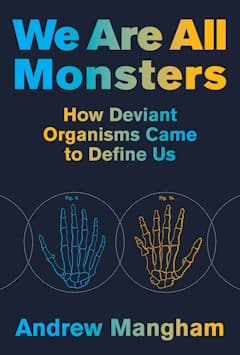
We Are All Monsters—How Deviant Organisms Came To Define Us by Andrew Mangham
(The MIT Press, 2023)
Reviewed by John Dodd
I love Monsters. I love the weird and wonderful nature of them. I love creatures that cannot exist in the realms of reality and that have powers and abilities well beyond the nature of the real world in which we live in.
This book isn’t about those sorts of Monsters…
I’m always interested to hear the different nature of how things are described, and I’m fascinated to see how monsters came to be from what was thought about years ago.
This book wasn’t about that either…
What this book does contain are interesting essays regarding the thinking of times gone by, together with a disclaimer at the front that the very definition of the word monster can be seen in a pejorative sense when used in the context to which It was used in times before.
Monsters as defined in centuries past, were often anything, anyone that was different in nature to the way in which ordinary people were, and the expectation of ordinary was narrow, a certain size, a certain height, a certain weight, no changes to their visible physiology.
By those definitions, I am a monster.
Or indeed a grotesque or any number of other terms used through the years to describe something that doesn’t conform to the expectations of normal. It has to be said that this came as something of a revelation to me, and not a welcome one.
So, while this doesn’t make for comfortable reading at the best of times, it does nonetheless present a fascinating insight into how things evolved over the years and how perspectives have shifted, along with the nature of how we look at things in general. The information presented is dense and while conclusions are offered, much effort is made to ensure that the reader can form their own opinions prior to the authors’ thoughts being offered. The bigger problem is that there’s a lot of concepts thrown in there, and while there are references to all of it, when you’re looking to get a clearer perspective on something, sometimes a million references would be vastly improved by a few clear words.
I found a lot of the material in the book to be disturbing on a high level, I know from life that I’m treated differently because of who and what I am, but to read about it, to think that others have studied the nature of abnormalities, and then sought to catalogue them, that, provides me with the greatest of concerns, because there will still be people like that in the world. I will point out that the author is very clear that a lot of the language used in the book crosses lines that we have in place in modern day usage, and that they’re clear that many of the things that are studied are objectionable in their presentation, but for me, that gave the book its compelling nature.
When we look at how things were, we choose whether or not we learn from them, and this was a superb look at how things evolved, due in no small part to how the fiction of monsters was presented. We do not question that which is different to us, till we see some part of ourselves within it, and then we ask if it could be them, if what we see is a monster, or ourselves, darkly.
I didn’t love or enjoy this book, but it engaged my interest from start to finish, and the knowledge presented within was given with clarity and emotional detachment from those who first came up with it, which made it far more readable. It could have been made more accessible with less complex language, but that would have detracted from the scientific approach that was being taken, which is, for the most part, not for those without a similar background.
Review from BSFA Review 21 - Download your copy here.
